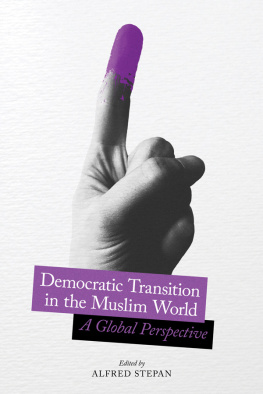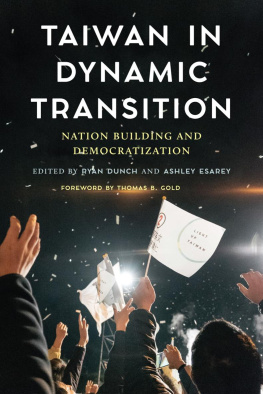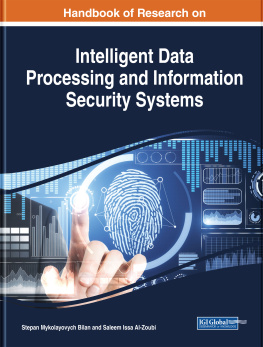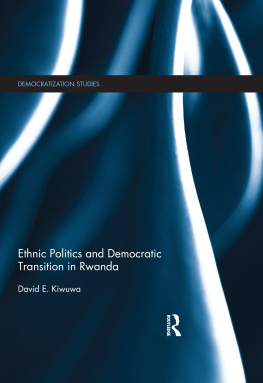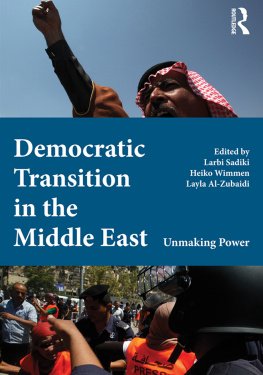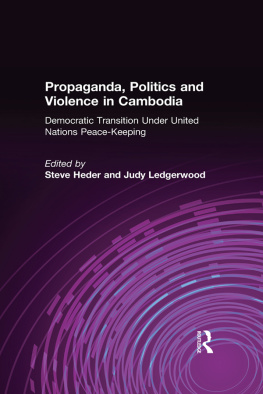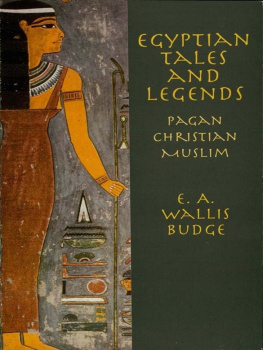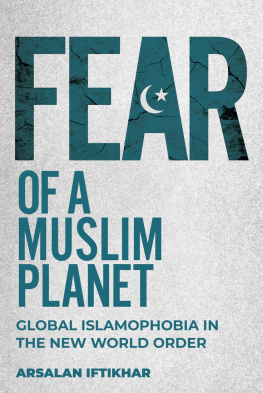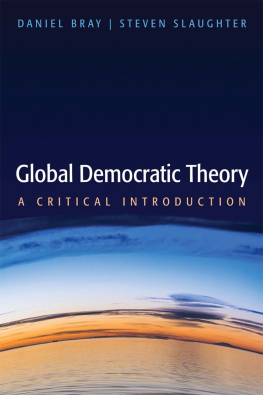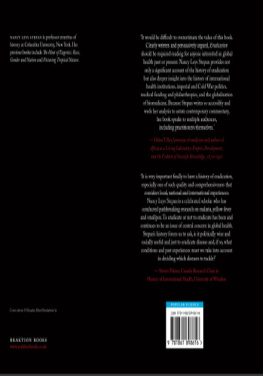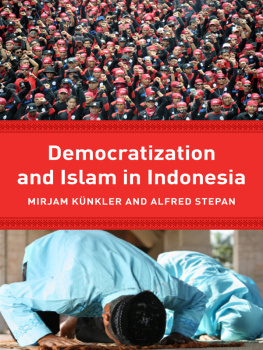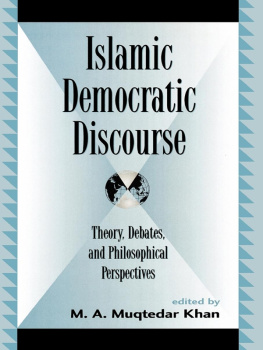DEMOCRATIC TRANSITION IN THE MUSLIM WORLD
RELIGION, CULTURE, AND PUBLIC LIFE
RELIGION, CULTURE, AND PUBLIC LIFE
Series Editor: Katherine Pratt Ewing
The resurgence of religion calls for careful analysis and constructive criticism of new forms of intolerance, as well as new approaches to tolerance, respect, mutual understanding, and accommodation. In order to promote serious scholarship and informed debate, the Institute for Religion, Culture, and Public Life and Columbia University Press are sponsoring a book series devoted to the investigation of the role of religion in society and culture today. This series includes works by scholars in religious studies, political science, history, cultural anthropology, economics, social psychology, and other allied fields whose work sustains multidisciplinary and comparative as well as transnational analyses of historical and contemporary issues. The series focuses on issues related to questions of difference, identity, and practice within local, national, and international contexts. Special attention is paid to the ways in which religious traditions encourage conflict, violence, and intolerance and also support human rights, ecumenical values, and mutual understanding. By mediating alternative methodologies and different religious, social, and cultural traditions, books published in this series will open channels of communication that facilitate critical analysis.
After Pluralism: Reimagining Religious Engagement , edited by Courtney Bender and Pamela E. Klassen
Religion and International Relations Theory , edited by Jack Snyder
Religion in America: A Political History , Denis Lacorne
For a complete list of titles see .
Edited by
ALFRED STEPAN
DEMOCRATIC TRANSITION IN THE MUSLIM WORLD
A Global Perspective
Columbia University Press / New York
Columbia University Press
Publishers Since 1893
New York Chichester, West Sussex
cup.columbia.edu
Copyright 2018 Columbia University Press
All rights reserved
E-ISBN 978-0-231-54541-9
Library of Congress Cataloging-in-Publication Data
Names: Stepan, Alfred C., editor.
Title: Democratic Transition in the Muslim World: A Global Perspective / edited by Alfred Stepan.
Other titles: Religion, culture, and public life.
Description: New York : Columbia University Press, 2018. | Series: Religion, culture, and public life | Includes bibliographical references and index.
Identifiers: LCCN 2017037856| ISBN 9780231184311 (pbk. : alk. paper) | ISBN 9780231184304 (cloth : alk. paper)
Subjects: LCSH: DemocratizationIslamic countries. | DemocracyIslamic countries. | Islam and politicsIslamic countries. | Islamic countriesPolitics and government21st century.
Classification: LCC JQ1852.A91 D447 2018 | DDC 320.917/67dc23
LC record available at https://lccn.loc.gov/2017037856
A Columbia University Press E-book.
CUP would be pleased to hear about your reading experience with this e-book at .
Cover Design: Martin Hinze
CONTENTS
WHY DIFFERENT DEMOCRATIZATION OUTCOMES IN TUNISIA AND EGYPT?:
Cross-Ideological Accommodations, Constitutions, Militaries, and the Content of International Assistance
1. ENNAHDAS DEMOCRATIC COMMITMENTS AND CAPABILITIES:
Major Evolutionary Moments and Choices
Rached Ghannouchi
2. THE CHALLENGES OF DEMOCRATIZATION IN THE ARAB WORLD:
Some Reflections on the Egyptian Case
Carrie Rosefsky Wickham
3. MUTUAL ACCOMMODATION:
Islamic and Secular Parties and Tunisias Democratic Transition
Alfred Stepan
4. THE ROOTS OF EGYPTS CONSTITUTIONAL CATASTROPHE:
The Necessity of Marrying an Analysis of Context, Process, and Text
Nathan J. Brown
5. PURISTS AND PLURALISTS:
Cross-Ideological Coalition Building in Tunisias Democratic Transition
Monica Marks
6. PATTERNS OF CIVIL-MILITARY RELATIONS AND THEIR LEGACIES FOR DEMOCRATIZATION:
Egypt Versus Tunisia
Hicham Bou Nassif
Radwan Masmoudi
RETHINKING OTHER DEMOCRACIES WITH LARGE MUSLIM POPULATIONS:
What Policies Helped in Indonesia and India?
8. CRAFTING INDONESIAN DEMOCRACY:
Inclusion-Moderation and the Sacralizing of the Postcolonial State
Jeremy Menchik
Hilal Ahmed and Sudipta Kaviraj
A s this volume was going to press in September 2017, its editor, Alfred C. Stepan, passed away at his home in New York City. He was a pathbreaking scholar and educator in federalism, comparative politics, democratization, democratic transitions, and patterns of relations between religion and state, particularly in Muslim-majority democracies.
His death represents an enormous loss for these fields and for his many friends, colleagues, and students, including the contributors to this volume. Al was an extraordinarily kind and inquisitive human beinga wonderful mentor and role model to generations of scholars who will follow the paths he forged.
During his distinguished career, Alfred Stepan (19362017) authored and edited over fifteen books, including Problems of Democratic Transition and Consolidation (with Juan Linz), Arguing Comparative Politics , and Boundaries of Toleration (with Charles Taylor). His works have been translated into dozens of languages. From 1983 to 1991, Stepan served as dean of Columbia Universitys School of International and Public Affairs (SIPA). In 1993, he became the first rector and president of Central European University (with campuses in Budapest, Prague, and Warsaw), and he was Gladstone Professor of Government at All Souls College, Oxford University, from 1996 to 1999. He returned to Columbia Universitys SIPA in 1999 as the Wallace S. Sayre Professor of Government.
This book is Professor Stepans final edited volume. It grew from his deep fascination with and concern for Tunisias democratic transition, a fascination that spurred him to make seven separate research trips to the country since its revolution in 2011. It was during one of those trips, in March 2013, that I met Professor Stepan. At the time, I was based in Tunisia conducting riveting interviews but completely unsure which direction to channel my doctoral research. Instead of sloughing off young scholars, Professor Stepan sought their expertise in the field. Despite his enormous knowledge and distinguished stature, he cultivated an electrically curious mindconstantly learning, seeking, and nurturing other scholars. This book is the product of his immense work on Tunisia and of a lifetime spent studying the comparative politics of democratic transitions.
Until his very last, Professor Stepan kept seeking and sharing knowledge. In January 2017, just months before this volume went to press, he was in Tunisia, conducting up to six interviews a day by my side. The tenacious energy with which he approached his sharply insightful, question-driven research and the genuine concern he had for Tunisia, its people, and the survival of its fragile young democracy were unparalleled.
To have known Professor Stepan was to have received a rare education and to have encountered an extraordinary role model in research and in life. We are all in his debt.
T hanks to Columbia Universitys Institute for Religion, Culture, and Public Life and the Center for the Study of Democracy, Toleration, and Religion for bringing this community of scholars together to examine Tunisia, democracy, and Islam in comparative perspective.


